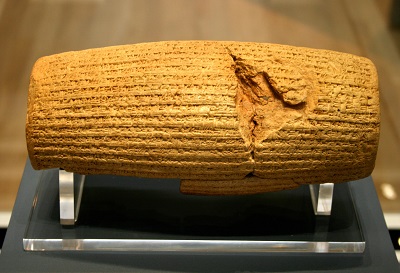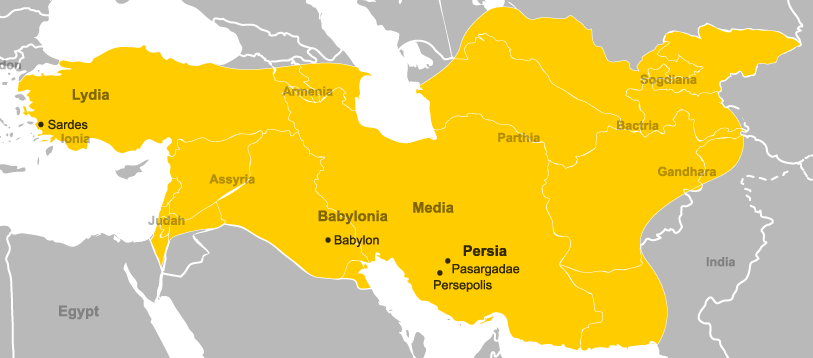Vast walls and deep ditches are an inestimable aid to a brave and well-commanded garrison; but they cannot be made entirely to supply the want of bravery and intelligence.
Continuing Cyrus Begins the Persian Empire,
our selection from A History of Greece by George Grote published in 1856. For works benefiting from the latest research see the “More information” section at the bottom of these pages. The selection is presented in seven easy 5 minute installments.
Previously in Cyrus Begins the Persian Empire.
Time: 600 – 530 BC
Place: Near East

CC BY-SA 4.0 image from Wikipedia.
Cyrus the younger, who had up to that moment felt assured that his brother would fight, now supposed that he had given up the idea of defending Babylon: instead of which, two days afterward, Artaxerxes attacked him on an open plain of ground where there was no advantage of position on either side; though the invaders were taken rather unawares in consequence of their extreme confidence arising from recent unopposed entrance within the artificial ditch. This anecdote is the more valuable as an illustration, because all its circumstances are transmitted to us by a discerning eye-witness. And both the two incidents here brought into comparison demonstrate the recklessness, changefulness, and incapacity of calculation belonging to the Asiatic mind of that day — as well as the great command of hands possessed by these kings, and their prodigal waste of human labor. Vast walls and deep ditches are an inestimable aid to a brave and well-commanded garrison; but they cannot be made entirely to supply the want of bravery and intelligence.
In whatever manner the difficulties of approaching Babylon may have been overcome, the fact that they were overcome by Cyrus is certain. On first setting out for this conquest, he was about to cross the river Gyndes (one of the affluents from the east which joins the Tigris near the modern Bagdad, and along which lay the high road crossing the pass of Mount Zagros from Babylon to Ekbatana) when one of the sacred white horses, which accompanied him, entered the river in pure wantonness and tried to cross it by himself. The Gyndes resented this insult and the horse was drowned: upon which Cyrus swore in his wrath that he would so break the strength of the river as that women in future should pass it without wetting their knees. Accordingly he employed his entire army, during the whole summer season, in digging three hundred and sixty artificial channels to disseminate the unit of the stream. Such, according to Herodotus, was the incident which postponed for one year the fall of the great Babylon. But in the next spring Cyrus and his army were before the walls, after having defeated and driven in the population who came out to fight. These walls were artificial mountains (three hundred feet high, seventy-five feet thick, and forming a square of fifteen miles to each side), within which the besieged defied attack, and even blockade, having previously stored up several years’ provision. Through the midst of the town, however, flowed the Euphrates. That river which had been so laboriously trained to serve for protection, trade and sustenance to the Babylonians, was now made the avenue of their ruin. Having left a detachment of his army at the two points where the Euphrates enters and quits the city, Cyrus retired with the remainder to the higher part of its course, where an ancient Babylonian queen had prepared one of the great lateral reservoirs for carrying off in case of need the superfluity of its water. Near this point Cyrus caused another reservoir and another canal of communication to be dug, by means of which he drew off the water of the Euphrates to such a degree it became not above the height of a man’s thigh. The period chosen was that of a great Babylonian festival, when the whole population were engaged in amusement and revelry. The Persian troops left near the town, watching their opportunity, entered from both sides along the bed of the river, and took it by surprise with scarcely any resistance. At no other time, except during a festival, could they have done this (says Herodotus) had the river been ever so low, for both banks throughout the whole length of the town were provided with quays, with continuous walls, and with gates at the end of every street which led down to the river at right angles so that if the population had not been disqualified by the influences of the moment, they would have caught the assailants in the bed of the river “as in a trap,” and overwhelmed them from the walls alongside. Within a square of fifteen miles to each side, we are not surprised to hear that both the extremities were already in the power of the besiegers before the central population heard of it, and while they were yet absorbed in unconscious festivity.
Continued below the map.

CC BY-SA 3.0 image from Ancient History Encyclopedia.
Such is the account given by Herodotus of the circumstances which placed Babylon — the greatest city of Western Asia — in the power of the Persians. To what extent the information communicated to him was incorrect or exaggerated, we cannot now decide. The way in which the city was treated would lead us to suppose that its acquisition cannot have cost the conqueror either much time or much loss. Cyrus comes into the list as king of Babylon, and the inhabitants with their whole territory become tributary to the Persians, forming the richest satrapy in the empire; but we do not hear that the people were otherwise ill-used, and it is certain that the vast walls and gates were left untouched. This was very different from the way in which the Medes had treated Nineveh, which seems to have been ruined and for a long time absolutely uninhabited, though reoccupied on a reduced scale under the Parthian empire; and very different also from the way in which Babylon itself was treated twenty years afterward by Darius, when reconquered after a revolt.
The importance of Babylon, marking as it does one of the peculiar forms of civilization belonging to the ancient world in a state of full development, gives an interest even to the half-authenticated stories respecting its capture. The other exploits ascribed to Cyrus — his invasion of India, across the desert of Arachosia — and his attack upon the Massagetae, Nomads ruled by Queen Tomyris and greatly resembling the Scythians, across the mysterious river which Herodotus calls Araxes — are too little known to be at all dwelt upon.
| <—Previous | Master List | Next—> |
More information here and here, and below.
We want to take this site to the next level but we need money to do that. Please contribute directly by signing up at https://www.patreon.com/history
Leave a Reply
You must be logged in to post a comment.